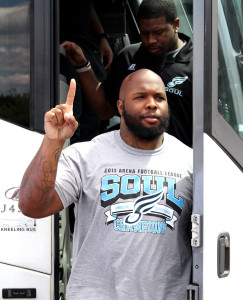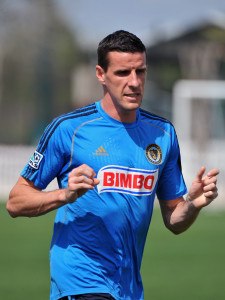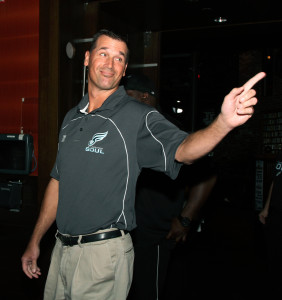
The Soul have gone to back-to-back Arena Bowls, yet struggle for respectability in Philly.
Photo Credit: Paige Ozaroski
Sticking Up For The Little Guys
Fighting for relevance is never easy. And fighting through the clutter of an over-saturated sports marketplace can be downright impossible. Even with the advent of niche blogging and budget-less marketing plans, sometimes some of the best stories in sports go unheard, like a tree falling in the woods.
For example, after Flyers coach Peter Laviolette was given his walking papers on Oct. 7, many in the mainstream media assumed that Eagles coach Chip Kelly — hired Jan. 16, 2013 — was the longest-tenured coach in Philadelphia. Turns out, Union manager John Hackworth held that distinction. He was named full-time manager on Aug. 30, 2012.
Or the heart-wrenching story of Kyle Miller, the brother of Philadelphia Wings goaltender Brandon Miller, who passed away this past June after a long battle with a rare form of cancer. Wings captain Brodie Merrill is Kyle’s best friend and the team hosts a variety of cancer fundraisers for Kyle’s “Beat It” campaign.
There are many other powerful and unreported storylines raging in South Philadelphia and beyond. There are also many professional sports leagues that the average fan probably doesn’t know exists.
Did you know about Major League Ultimate? It’s an ultimate frisbee league, which features eight teams, including the Philadelphia Spinners. They play home games at historic Franklin Field.
The challenge for these second-tier sports is gaining recognition. Executives realize they’ll never steal headlines from the Eagles, or the Phillies, or the Flyers, or the Sixers — well, maybe the latter — but people need to be made aware of their existence. It all starts with getting media coverage and improving public relations.
“It’s a big challenge. It’s like, with the Wings, when something goes awry, if there’s a brawl, that’s when people take notice,” said Wings president/owner Mike French. “When we put Twitter handles on the back of our jerseys everyone covered us on the planet. When we’ve asked for coverage or if it’s a slow night, we’ll get something.”
French knows how to be successful, it’s just a matter of getting on people’s radar. The Wings are talking to 94 WIP about possibly airing games on the radio.
“On Philly.com, we’re on the other section, other sports, so we’re trying to use our influence to get our own Wings page. Our captain does a blog for Philly.com, but it’s a crowded field. When I was playing, Ray Didinger had front-page articles for lacrosse. But it’s fallen off, and part of it is our fault. Our PR people were just answering the phones and not being proactive. We need to be more proactive.”
The NLL (National Lacrosse League) has a TV contract with CBS Sports, but only for a certain number of games. The league is also shown sporadically on CSN, TSN and ESPN. However, TV production costs come out of the franchise’s own pockets. The majority of Wings games are streamed on YouTube to save money. As French stated, attendance has dipped from around 16,000 per game to 9,000 over the past decade.
“I don’t know that we can ever bridge that gap with us and the four majors,” French said. “I think we can get to a point because it’s such a fast-growing sport that we can be in the top of the next tier. What we’re trying to promote is the experience.
“We play nine home games and it’s action-packed fun. You can go there and buy a ticket for $20. I go to a hockey game, and I pay $100 for a ticket; I go to soccer game and I fall asleep because there’s no scoring; I go to a basketball game and it doesn’t look like they’re trying that hard.”
Philadelphia Union: The Fourth Major?
Some teams are willing to accept their place in a crowded sports landscape. Others, like the Philadelphia Union, don’t see it that way. The Union have a gorgeous, state-of-the-art stadium, PPL Park in Chester, that opened in 2010. The club routinely sells out the $120-million facility, which holds 18,500 loyal soccer fans. The Union are competitive and the atmosphere at home games is intimidating, led by the wildly-intense Sons of Ben supporters section.
It’s no wonder Union CEO Nick Sakiewicz sounded a little offended when asked how he felt about being a second-tier sport in Philadelphia. According to Sakiewicz, there are really five major sports franchises in the city, not just four.
“There’s no doubt we’re a part of that group [the four major teams],” said Sakiewicz. “We’ve been in that group since Day 1. Our season ticket base is as much as four times the size as some of the four in that group, our TV ratings in a lot of cases are larger, our stadium is full to capacity at a higher percentage than some of those other teams, so we actually feel that we’re very relevant in this sports landscape. We’ve been that way since our first year and we’re in our fourth year now. If you measure our success by attendance and TV ratings, then there’s a good argument to be made that we’re three or four in that group, not five.”
The Union may not snag headlines in Metro Philadelphia or The Philadelphia Daily News, but they have an extensive network of soccer blogs and publications that follow their every corner kick or yellow card.
“Our fans our very young. They’re upscale and mainly are fans of just soccer and honestly they don’t really buy newspapers,” said Sakiewicz. “It’s not that critical for us to have headlines in newspapers because our fans are getting news from the internet and social media. It’s nice to see a newspaper sitting at a WaWa every now and then with a picture of Jack McInerney on it, but it’s not a primary place for our fans to get their news.”
Soccer fans, especially the hardcore ones, are a different breed. That in no way is a knock. They are extremely loyal to the sport and their favorite club. The Union ranked No. 12 in MLS (Major League Soccer) this past season with an average attendance of 17,867, a figure that stacks up favorably against the Flyers (19,786 in 2012-13) and edges out the Sixers (16,717 in 2012-13).
While Sakiewicz admits he is constantly trying to grow the Union, he is comfortable about where they reside right now. He is extremely proud of the club’s digital reach, citing more than 110,000 Facebook likes on the Union’s page.
“We’re quite a sizable market of soccer fans. Our ticket sales are 97.6-percent of the capacity of the stadium,” Sakiewicz said. “Unless we get a bigger stadium we can’t really accommodate much more. Having said that, we do continue to try and build our TV ratings and our viewership, but we’re good. We have plenty of soccer fans. I’m not interested in trying to draw in baseball fans, hockey fans or football fans. We have more soccer fans then our stadium can hold right now.”
Weighing The Cost Of Celebrity
One of the biggest challenges facing second-tier sports is a lack of legitimate star power. Derrick Ross is a running back for the Philadelphia Soul of the Arena Football League (AFL). This past June, the 29-year-old Ross shattered the AFL’s all-time rushing record, a mark that had been set in 2007.
Metro Philadelphia was one of the few media outlets to report the milestone. It wasn’t because Ross isn’t a great football player, it’s because he isn’t a household name. That’s a problem in every AFL locker room from here to Arizona.
The Soul have a unique predicament, though. Co-majority owner Ron Jaworski is practically an NFL legend and his face can be seen daily on ESPN as a football analyst. Jaworski is the definition of star, but he chooses to keep a low profile when it comes to promoting the AFL.
“I intentionally try to keep a low profile because I want our players to be the stars,” Jaworski told me. “The era of John Elway owning a [AFL] team and Bon Jovi being my partner — we did too much of that off-the-field celebrity stuff — the best thing for the growth of our franchise and the Arena Football League is to promote our players and our head coach.”
The Soul won the ArenaBowl in 2008 when the franchise was co-owned by Jaworski and Bon Jovi. They won it before the Phillies paraded down Broad Street, meaning technically they were the first professional sports franchise in Philadelphia to win a championship since 1983. One year later, the AFL folded. Bon Jovi sold his minority ownership.
“The business model was broken, it had to be fixed,” Jaworski said. “We came back in 2010 and fixed the business model. Now we’re growing. I believe Philadelphia is the greatest sports city in America. We know the Sixers, Phillies, Flyers, Eagles have enormous followings. We told our fans back in 2004 that our commitment was to win a championship, and we did that in 2008. And that continues to be our goal. That has never changed, to be the champion.”
Jaworski is genuine in his enthusiasm, too. He believes in the product, citing its influence on the NFL.
“A lot of the passing concepts we are seeing being implemented now in the NFL, like bubble screens, were developed and nurtured in the AFL,” Jaworski said. “A lot of NFL coaches are looking at us. The concepts that are being used in the AFL are now being used in the NFL.”
But even an AFL loyalist like Jaworski knows the grim reality. Unlike Union CEO Nick Sakiewicz, he sees the Soul as a second-tier team in Philadelphia. Jaworski is fine with that. He is devoting all his time and energy on generating more exposure, and hopefully inking a major TV deal in the coming months.
His blueprint is working. The AFL has seen substantial growth since taking a one-year hiatus in 2009. Sponsorships have increased 300-percent from 2012. Games are being televised on CBS Sports Network and Comcast SportsNet, and ArenaBowl XXVI — the Soul fell to the Arizona Rattlers, 48-39 — was shown on CBS. Jaworski said the AFL is in talks with FOX and ESPN.
“I’m not blinded by who we are and what we are. I get that and we get that, we’re a second-tier team in the city,” Jaworski said. “But that doesn’t mean that we’re not going to strive to compete with the four major teams. We’re in discussions with FOX and ESPN. We want to get back in the spotlight. We know we have an uphill climb to compare ourselves to the four other teams in Philadelphia, but that doesn’t mean we’re not trying.”
According to Jaworski, the three biggest challenges are winning, filling up the seats and working on the long-term development of the league. The first part seems to be taking care of itself, but the last two are ongoing challenges, not just for the Soul but for every second-tier sport.
“Our biggest challenge is always budgeting,” Jaworski said. “We don’t have the budgets the other teams do, so we have to out-work people. We don’t have the big budgets that the Phillies and Eagles have, so the mantra of our entire organization, from the players to the front office, is to work our tails off.
“With that being said, the four majors have been great to us. [Eagles GM] Howie Roseman comes to games, [Eagles coach] Chip Kelly came to tryouts. It’s very important that we get that respect from the other competing teams in town.”
Respect is earned. The Soul are getting there. And Jaworski won’t be content until Soul highlights are leading Jim Gardner’s 6 p.m. news broadcast.
“No, I’m not content. When we first started [in 2004], we had sell-out crowds of 17,000. I want to get back there,” Jaworski said. “I want the local TV stations to realize how relevant we are and lead the 6 o’clock news with the Soul Report and Soul highlights. I want people to realize how relevant we are.”
But is that possible?
“Yes, it is a possibility and it will be a reality,” Jaworski said. “I can’t give you a time frame, but we’re going to work hard to make it a reality.”
Just Win, Baby, Just Win
Selling tickets and securing broadcast rights are always going to be the two biggest challenges for second-tier sports. A league like the NFL has the networks literally fighting over them and throwing money at commissioner Roger Goodell. FOX pays the NFL to let them show games.
That happens to a lesser degree in the Arena Football League, and Major League Soccer, and the National Lacrosse League. While those leagues are constantly negotiating with the networks, it all starts with controlling what you can control. And that starts with putting a good product out on the field — or, more simply, winning.
“They [the Soul] had a little advantage with Bon Jovi, I can’t give a free concert,” French joked. “The biggest thing is winning, and we haven’t won a championship since 2001, so I think winning will help get some of those people back [in the seats]. We found when we won six in a row, our attendance jumped, then we lost four in a row and it went back down.”
French estimated attendance at Wings games was around 9,000. That was down from 16,000 during their 2001 championship run.
“We last won the championship in 2001,” French said. “Not only did we let the brand value deteriorate a bit, we also didn’t have our team as well prepared as we should have.”
The Soul are up at 10,000 fans per game, according to Jaworski. That was down from 17,000 when the franchise was started in 2004. The Union, further supporting their claim as the fifth major, average a shade under 18,000.
“Fans like to see winning, and we’ve gone 28-9 over the last two years, that’s a 75-percent winning percentage,” Jaworski said. “Off the field, we’re in the community. The “Soul Moving Experience” helps to being the Hunting Park Aztecs and YMCA groups to games. When fans come to our games, they leave happy, with a smile on their face, because we win.”
“I don’t know that we’ll ever get back to [16,000],” French said. “Football is football, it’s always popular. Lacrosse is different, but it’s on a significant upswing. We have a pretty good chance of getting it back there if the moons align. If we win, we market it better, get people engaged and let them know that we have the best players in the world.”
Expansion is also a driving factor. The AFL has 14 teams right now. The NLL has just nine teams, but they haven’t lost a franchise in five years (in Boston). The MLS has 19 teams, with plans to expand to 24 by 2020. Business is good and none of the leagues are worried about folding.
“I don’t worry about that at all. Our league offices are pretty sound financially,” said French, who is head of the NLL membership group. “I think we’re OK. I’m more concerned with how do we get to 16 teams, and get in those markets with voids. We don’t have a lot of West Coast teams and lacrosse is really thriving out there. We need to get to 18-20 teams. We have geographies in the country that don’t have the same exposure. I think we just have too many gaps.”
“Quite honestly, I’m not worried [about folding],” Jaworski said. “More expansion teams are coming, I can’t say when or where, but they are coming in major cities. The future is bright. The AFL has been around for 26 years, that’s not an accident. Can it be better? Yes. But I’m not disappointed about the way things are. In fact, I’m very excited about the future.”
The main reason these owners are in it is for love of the game. Do they want to draw in larger audiences? Of course they do. But, they are also realistic. It all starts with appealing to their core fan base and season ticket-holders.
“We’re focusing on the lacrosse community first,” said French. “Unlike the other secondary sports, we have the best players in the world. This isn’t, and I hate to say this, arena football. These are all-state players, best of the best, from all the good colleges.”
“Number one thing is the game. It’s a fast-paced, family atmosphere that’s affordable,” Jaworski said. “You don’t have to take out a second mortgage on your house to enjoy arena football. It’s a fun environment, and it’s exciting. We’ll score more points in a half than the Union will score in a season.”
“We’re a team that plays Philly tough,” said Sakiewicz. “We’re a hardworking team and young team that gives all of its effort from whistle to whistle. We play very entertaining, attacking-style soccer with a lot of energy.”
Blasts From The Past
There have been a plethora of Philadelphia-based franchises that went quietly into that good night after semi-successful runs here. One major reason why second-tier sport franchises fold is due to obvious reasons, like poor ownership.
“You don’t want somebody that is a lacrosse fan to buy a team. They won’t get a lease at the building [arena],” said Wings president/owner Mike French. “We’ve had mistakes [in NLL], and we’ve learned from them. That happened in Pittsburgh, and at Nassau Coliseum … Madison Square Garden didn’t survive because they had a bad lease. You want somebody that is either affiliated with the building or has another team in the building, or a special relationship with the building, like Comcast does with the Wells Fargo Center.”
Here are a few examples of franchises that couldn’t survive in Philly:
» Philadelphia KiXX, of the Major Indoor Soccer League: They were founded in 1995 and disbanded in 2010, playing home games at the Spectrum and Liacouras Center during that span. Won championships in 2001-02 and 2006-07. Surprisingly, the Kixx website is still active. Team executives couldn’t be reached for comment.
» Philadelphia Charge, of the Women’s United Soccer Association: Played three seasons (2001-2003) at Villanova University. Olympians Heather Mitts and Hope Solo played for the Charge. League suspended operations on Sept. 15, 2003.
» Philadelphia Barrage, of Major League Lacrosse: Originally founded in Bridgeport, Conn. the franchise moved to Philly in 2004. They won three championships (2004, 2006, 2007) while playing home games at Villanova University. The team folded before the 2009 season.
» Philadelphia Independence, of Women’s Professional Soccer: Founded in 2009, the franchise played at West Chester University in 2010 before moving to Widener University in 2011. Earned a playoff berth in 2010. League folded on May 18, 2012.
» Philadelphia Atoms, of the North American Soccer League: Played from 1973-1976 at Veterans Stadium and Franklin Field. Won a championship in their first season of existence and goaltender Bob Rigby appeared on the cover of Sports Illustrated. Team dissolved in 1976.
— Freelance reporter Jeff McMenamin contributed to this article. This story was first written for Metro Philadelphia newspaper, but never ran in print or online editions.
 Philly Sports Jabronis
Philly Sports Jabronis



